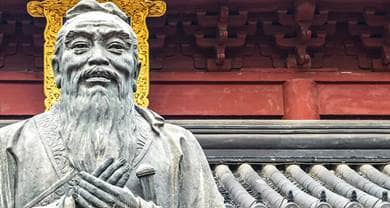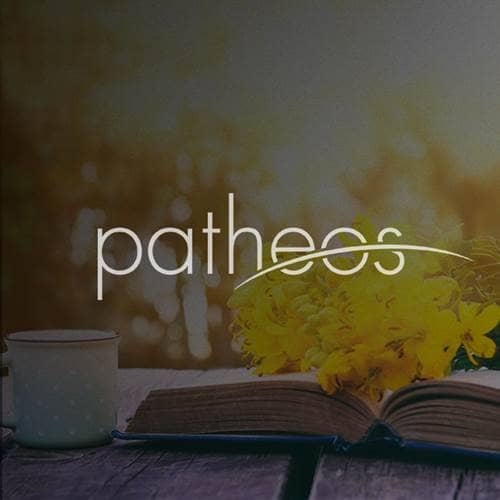- Trending:
- Forgiveness
- |
- Resurrection
- |
- Joy
- |
- Feminism
- |
- Afterlife

RELIGION LIBRARY
Confucianism
Vision for Society
Kongzi envisioned a society in which all lived in harmony, content with their place within the social hierarchy. He believed that if a ruler's moral character was exemplary, this would influence his people to behave morally as well.
If xiao exemplifies the spirit that Confucians believe ought to animate social interactions, then li (ritual) provides the model for the practice of social relationships. Indeed, Kongzi is said to have taught his students only three things: poetry, history, and ritual (Lunyu 7:18). The Han dynasty compendium of Confucian ritual lore, the Liji (Record of Ritual), begins with this description of li:
Always and in everything let there be reverence; carry yourself as if you were deep in thought, and speak calmly and composedly. How peaceful people will be then!
For Confucians, ritual properly performed renders society as tranquil and at ease. This peaceful image lies at the heart of the Confucian social vision. When speaking of li, Kongzi said: "In the practice of ritual, tranquility is most precious" (Lunyu 1:12). Moreover, ritual's power to order society peacefully lies with its essentially non-coercive, persuasive nature:
Direct the people by means of laws, unify them by means of punishments, and they will become evasive and moreover will have no sense of shame; direct them by means of moral charisma, unify them by means of ritual, and they not only will have a sense of shame, but moreover will be good by themselves (Lunyu 2:3).
But what do Confucians mean by ritual, that they credit it with the power to transform society without a single shot being fired? It is important to bear in mind that, for Kongzi and his disciples, ritual is not mere ceremony -- gestures choreographed for polite occasions. Rather, ritual is moral life at its most fundamental, lived out in social interaction. Kongzi's most beloved student, Yan Hui, once asked about moral perfection. His master told him:
To subdue oneself and return to ritual is moral perfection. If one is able to subdue himself and return to ritual for just one day, the whole world will call him virtuous (Lunyu 12:1).

In order for society to attain the Confucian ideal, its members must learn to subdue themselves. Like morality, ritual is relational; for a person stranded on a desert island, neither ethics nor manners have much meaning. For a person afloat in the sea of society, as most people are, the ritualization of everyday human interactions -- greetings and farewells, requests and thanks, births and deaths -- provides a way in which to enlarge one's sense of self by incorporating the needs and desires of others into one's notion of what is good, right, and desirable. "Without knowing ritual, one cannot develop one's character," says Kongzi (Lunyu 20:3). Thus, ritual is a school of virtue, a necessity for social survival, and the key to social harmony.
Kongzi dreamed of a peaceful society in the midst of civil war, social turmoil, and chronic conflict. Over a thousand years later, when his spiritual descendants, the Song dynasty "Neo-Confucians," found themselves in a position to put Kongzi's theories into widespread practice, they naturally turned to ritual as the means of harmonizing society.
 Like other "Neo-Confucians," Zhou Dunyi (1017-1073) believed that every human being could attain sagehood -- that is, could fully develop his Tian-endowed moral and spiritual potential and act in concert with the cosmos, for the benefit of all. When asked about the essentials to be mastered in learning to be a sage, Zhou replied:
Like other "Neo-Confucians," Zhou Dunyi (1017-1073) believed that every human being could attain sagehood -- that is, could fully develop his Tian-endowed moral and spiritual potential and act in concert with the cosmos, for the benefit of all. When asked about the essentials to be mastered in learning to be a sage, Zhou replied:
To be unified is essential. To be unified is to have no desire. Without desire one is empty when still and direct in activity. Being empty when still, one will be clear; being clear, one will be penetrating. Being direct in activity, one will be impartial; being impartial, one will be all-embracing. Being clear and penetrating, impartial and all-embracing, one is almost a Sage. . . .
Here, Zhou is synthesizing both the Buddhist and Taoist traditions of his own time and combining them with Kongzi's vision of tranquility as both the root and the result of ritual practice. To ritualize the self is to overcome selfish desires, focus one's efforts on the good of all, and belong completely to the whole of society. Zhou's disciple, Zhu Xi, devised an entire manual of rituals for use in the family home, the Jiali (Family Rituals), which then was widely adopted across East Asia over the next several hundred years. The manual begins with a statement of first principles in establishing a household:
When a profound person builds a house, his first task is always to set up an offering hall . . .
Zhu's manual was revised and reprinted dozens of times and succeeded in bringing members of nearly every social stratum in China, not to mention those in Vietnam, Korea, and Japan, into compliance with his Confucian vision of society as a grand, perfectly-choreographed ballet. This is all the more remarkable, given Confucianism's lack of institutional coercion (no papal magisterium, no fatwa, no holy wars to root out the infidel, no conquests to swell the ranks of converts) -- and all the more consistent with Kongzi's ideal of ritual as ultimately efficacious, because ultimately non-coercive.
Confucianism largely exists today as a diffuse, rather than as an institutional, religion. Those who seek Confucianism, as others seek particular religious traditions, in buildings such as temples and persons such as clergy may look in vain. Instead, Confucianism may be most alive today as a lived social reality.
The social vision of Confucianism still explains a great many social customs and experiences across East Asia. One example is the Japanese social virtue known as wa (harmony), which non-Japanese have used to explain everything from Japanese business practices to Japanese baseball. Wa may be understood as a distinctively Confucian ritualization of all social interaction. As is well known, Japanese culture favors indirect communication and allusive suggestion over direct communication and explicit expression. While this can frustrate non-Japanese, especially Westerners who may prefer more straightforward social interaction, it does have the virtue of helping to minimize disagreement, neutralize confrontation, and pacify resentment. From the Confucianized Japanese perspective, it seems, no social problem or tension is so important that it ought to take precedence over the preservation of social harmony. If one wishes to see Confucianism, and especially Confucianism's vision of society, in action today, one need look no further than present-day Japan (and much the same could be said of China, Korea, and Vietnam).
Study Questions:
1. How do Confucians see the relationship between ethics and ritual?
2. Why is ritual practice so important to Confucians?
3. What was Zhou Dunyi's contribution to Confucian ethics?
4. What are some examples of Confucian ethics in practice today?










